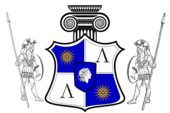Empire of Lysimachia
Empire of Lysimachia Αυτοκρατορία της Λυσιμαχείας | |
|---|---|
| Motto: ΙΣΧΥΣ ΔΙΑ ΤΗΣ ΓΝΩΣΕΩΣ POWER THROUGH KNOWLEDGE | |
| Anthem: Τῇ ὑπερμάχῷ στρατηγῷ | |
| Greece | |
| Capital | Thessaloniki |
| Official languages | Greek |
| Demonym(s) | Lysimachian |
| Government | Constitutional Monarchy |
• Co-Emperors | • Alcibiades I • Thomas Marios I |
• Prime Minister | Tom Mark |
• Deputy Prime Ministers | • Edward-il Sung • Pun Watta |
| Establishment | 6 May 2020 |
| Population | |
• Census | 46 |
| Currency | Euro (€) de facto |
| Time zone | GMT +2 |
The Empire of Lysimachia was a micronation created on the 6th of May 2020 as a result of the Union between Imperium Aquilae,the Empire of Ovrestlia and the Grand Duchy of Paionia.
Name
The Empire of Lysimachia is named after Lysimachus a Macedonian officer and succesor of Alexander the Great.At one point he was King of Thrace,Macedonia and Asia Minor.
History
Before the Union all three nations had close ties with eachother.The idea of a Union was first proposed by Alcibiades I (Head of State of both Imperium Aquilae,Paionia and co-Emperor of Ovrestlia).On May the 4th 2020 the proposal was officialy sent to Thomas Marios I (Emperor of Ovrestlia).The same day the proposal was put to vote and passed in all 3 states.After 2 days of preparation,on May the 6th 2020 the Empire of Lysimachia was officialy proclaimed.It was dissolved after the seccesion of Ovrestlia
Administrative Division
The Empire of Lysimachia was split into 3 constituent states.
Government
The Empire is a Constitutional Monarchy ruled by both Alcibiades I and Thomas Marios I.The assembly of the Empire is the Imperial Council which consists of 9 Members.Each constituent state has their own members.The number of members a constituent state has is based on its population.The Council is made up of the 2 Emperors 2 Councilors chosen by the Emperors and 5 elected Councilors.
In early May, Lysimachia was in political turmoil, as members of various parties could not find a common ground on the government composition. As a result, 3 elections were held in the span of 5 days.
On May 17, Tom Mark was appointed Prime Minister. He is regarded as the country's first stable and widely recognized government leader.

